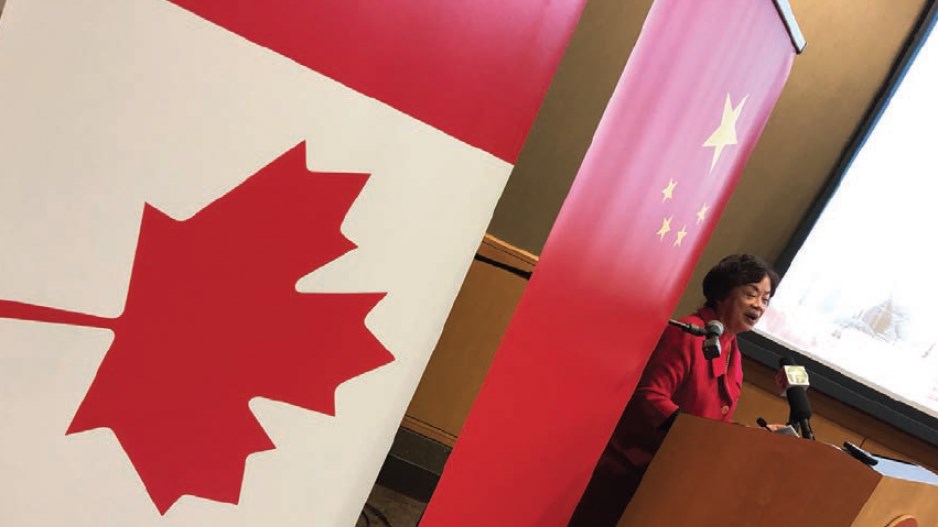Canadian multinationals or small and medium-sized businesses with more diversified client bases may be able to find ways to adjust to the growing unease between Canada and China in the wake of the Huawei Technologies Co. Ltd. conflict.
But for Canada’s cluster of trade associations dedicated to building Canadian business ties to the Chinese market, there is no alternative – and officials from those associations say they will do their best to maintain links to what they consider a vital driver of the local economy.
“You can’t say you are not worried,” said Jeannie Cheng, chair of the Vancouver-based Canada International Trade Promotion Society (CITPS), which was the lead organizer of B.C.’s delegation to the high-profile China International Import Expo in Shanghai last November. “But we understand trade. We have experience…. We have a long-term relationship with China that, even if there are stormy periods, I think it will be temporary.”
Cheng noted that of the 18 B.C. companies that participated in the Shanghai expo last November, 14 were registered through CITPS – an upstart in the Chinese-Canadian trade association cluster. Those companies, including FurCanada, Xypex Chemical Corp., Canadian Pacific Algae Inc. and Mozen Fashion Co. Ltd., have all applied to participate again in this year’s Shanghai expo.
“The companies were very interested in coming back,” Cheng said, noting that the delegation was able to secure a number of contracts with Chinese partners. “When we met up for dinner as the 2018 show wrapped up in November, they were already discussing what they want to do for next year’s exhibition.”
Huawei CFO Meng Wanzhou was arrested in Vancouver on December 1 and is awaiting her extradition hearing, scheduled to begin on March 6. Since that time, China has arrested three Canadian citizens, although Beijing said the arrests were unrelated to the Meng case, over which Chinese diplomats continue to voice Beijing’s objection.
Cheng said that the international dispute caused CITPS to cancel a plan to write a letter to Ottawa imploring federal authorities to pursue a bilateral free-trade agreement with China. But she added she feels that small and medium-sized enterprises (SMEs) with almost no relations to Huawei or the contentious 5G-network issues should continue to chase the Chinese market. CITPS has not seen any changes in day-to-day trading with China since December, Cheng said.
Another Vancouver-area Chinese-Canadian trade association, the North America Investment Association (NAIA), which has closer ties to southern China and led a delegation to the Hong Kong Belt & Road International Food Expo last June, said the Huawei incident and the Chinese arrests have dampened the business intentions of Canadian SMEs without existing ties to China.
But Noah Huang, NAIA’s secretary general, said the fact that the association’s marquee event is being held in Hong Kong – a special administrative region of China separate from the mainland Chinese market – could be an advantage for the group’s efforts to draw interest from Canadian SMEs.
“A lot of Canadian, non-Chinese businesses are more worried about everything happening around the Meng Wanzhou incident, and some may now be reconsidering whether or not they want to do business in China,” Huang said. “In that situation … Hong Kong’s position internationally is a little more independent, so there’s less concern about what may or may not happen with the Chinese mainland market.”
Huang also noted that NAIA will focus on the Hong Kong expo’s theme of One Belt, One Road (OBOR), China’s regional economic plan to connect East Asia to Europe through new land and maritime trade corridors. As such, the expo has been and will continue to be well attended by foreign firms beyond the Chinese border, something that Canadian SMEs can take advantage of.
“The OBOR food show isn’t just about China,” Huang said. “There are a lot of countries throughout Asia who are participating, not to mention players from the Middle East, Africa and Europe. So this exhibition should be an attractive proposition, even if trade with the Chinese market slows down a bit as export becomes more difficult. Because you’d want a chance to expand your market a bit – and the Hong Kong exhibition will be more conducive to that.”
The biggest, oldest and most prominent among these trade groups, the Toronto-based Canada China Business Council (CCBC), has been more reserved on the issue. When asked how it plans to proceed in promoting Canada-China trade, the group issued a statement that it is “closely monitoring the situation” and advising its members “to check the Global Affairs Canada website for updates.”
The CCBC, the statement added, has asked Ottawa to inform it of “any issues they may be encountering.” The group declined further comment.




